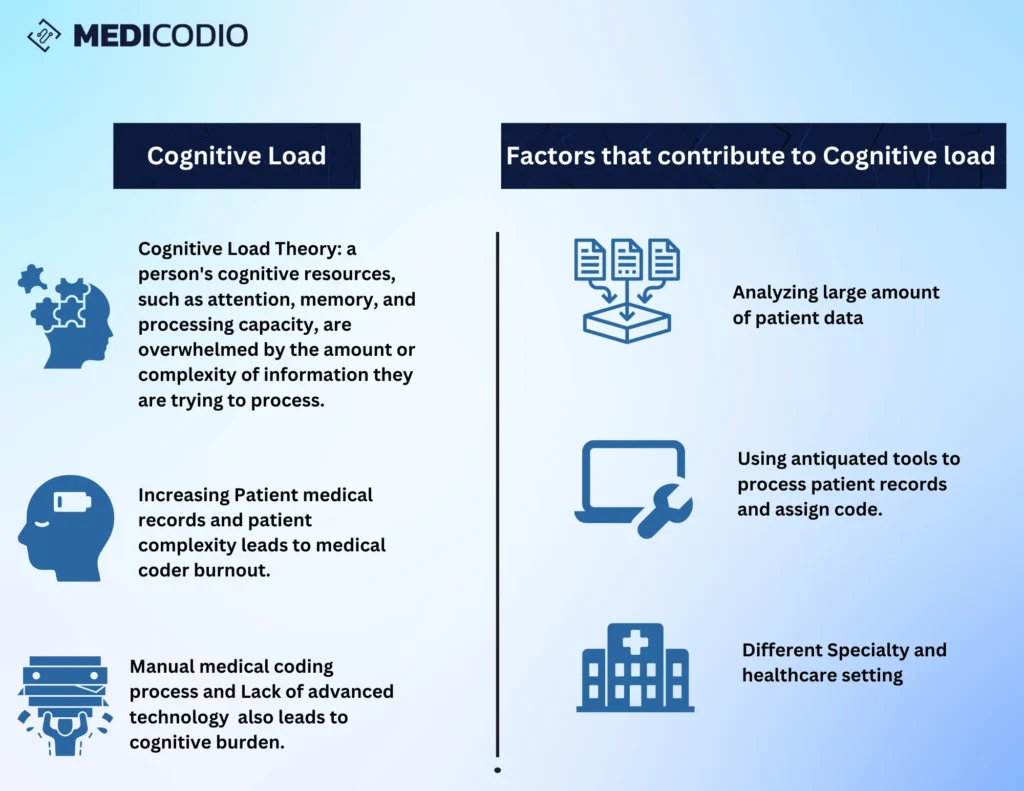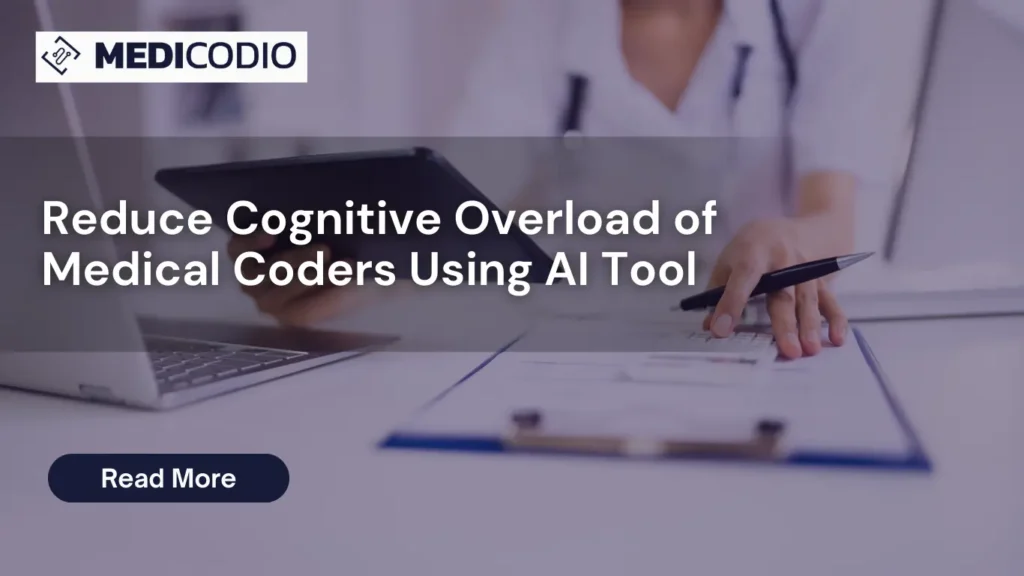What is Cognitive Load?
Cognitive load refers to a situation where a person’s cognitive resources, such as attention, memory, and processing capacity, are overwhelmed by the amount or complexity of information they are trying to process. This can lead to difficulties in learning, decision-making, problem-solving, and overall cognitive performance.
Healthcare and RCM leaders aim to reduce the cognitive overload of medical coders by organizing information effectively, using advanced technologies, providing clear instructions, minimizing distractions, and optimizing the user experience to support cognitive load management.
Cognitive Load of Medical Coders
According to the cognitive load theory, there is a high chance that an individual gets overburdened by the vast amount of information to process, which impacts their decision-making. In the healthcare industry, healthcare administrators and medical coders face increasing cognitive load as the number of patients has increased and the complexity of patient care has risen, leading to potential burnout.
The overall process of reviewing patient records, examining the records to pinpoint the diagnoses (conditions), and assigning appropriate medical codes is overwhelming. The report suggests that medical coders are under a lot of pressure as they must maintain a high-quality standard of work in less time while keeping abreast of ever-changing rules and regulations.
As per the cognitive load theory, three types of loads pave the way for the burden: intrinsic, extraneous, and germane.
An example of intrinsic load includes a medical coder analyzing patient records from an EHR tool. During this process, the medical coders must understand complex medical terminology.
Medical coders experience extraneous load when they deal with complicated EHRs, time-consuming manual processes, and antiquated tools. In addition, they face a Germane load when they are tasked to synthesize patient data from multiple sources and analyze and understand the condition. The continuous stress and heavy workloads lead to chronic physical and emotional exhaustion causing burnout.

Use of Artificial Intelligence to address the Cognitive load of Medical Coders.
Artificial Intelligence (AI) has emerged as a transformative tool in the realm of medical coding, particularly in mitigating the cognitive load experienced by professionals in this field. By harnessing machine learning algorithms and natural language processing capabilities, AI systems can streamline the coding process, allowing coders to focus their cognitive resources more effectively. These systems analyze vast amounts of medical documentation, extracting pertinent information and suggesting appropriate codes, thereby reducing the burden on coders to manually sift through complex data.
Moreover, AI-powered coding solutions not only enhance efficiency but also improve accuracy in medical coding practices. By cross-referencing patient records, clinical guidelines, and billing requirements, these systems can flag potential discrepancies or errors, enabling coders to make informed decisions and ensure compliance with regulatory standards. This not only reduces the risk of coding inaccuracies but also enhances the overall quality of healthcare data, which is crucial for healthcare providers, insurers, and policymakers alike.
Furthermore, the integration of AI in medical coding holds the promise of continuous improvement through iterative learning. As these systems process more data and receive feedback from coders, they can refine their algorithms, adapt to evolving coding conventions, and provide increasingly tailored recommendations. This iterative process not only fosters greater accuracy but also empowers coders by augmenting their expertise with AI-driven insights, ultimately leading to more efficient and precise medical coding practices. In essence, AI serves as a powerful ally in alleviating the cognitive load of medical coders, enabling them to work more effectively in an increasingly complex healthcare landscape.
Say Hello to CODIO, an AI-powered medical coding tool by MediCodio.
MediCodio’s AI-based medical coding tool significantly reduces the cognitive load of medical coders by streamlining and automating various aspects of the coding process. One of the ways it achieves this is through its intelligent code suggestion system. By analyzing vast amounts of medical data and coding guidelines, MediCodio’s AI can suggest accurate codes for procedures and diagnoses, relieving coders from the cognitive burden of manually searching for codes and deciphering complex medical terminology. This not only speeds up the coding process but also reduces the likelihood of errors that can arise from human fatigue or information overload.
Furthermore, MediCodio incorporates a user-friendly interface designed to enhance cognitive load management. The platform presents information in a clear and organized manner, making it easier for coders to focus on coding tasks without being overwhelmed by irrelevant data or complex workflows. Features such as real-time feedback and error detection further support coders in maintaining accuracy and efficiency, ultimately leading to improved productivity and reduced cognitive strain on medical coding professionals.
Learn more about CODIO, and how you can manage cognitive load management for medical coders. We would be delighted to provide you with a demo to showcase the features and benefits of our product. To proceed, you can schedule a demo at your convenience by using the following link: https://calendly.com/medicodio/medicodio-discovery-call?month=2024-01





